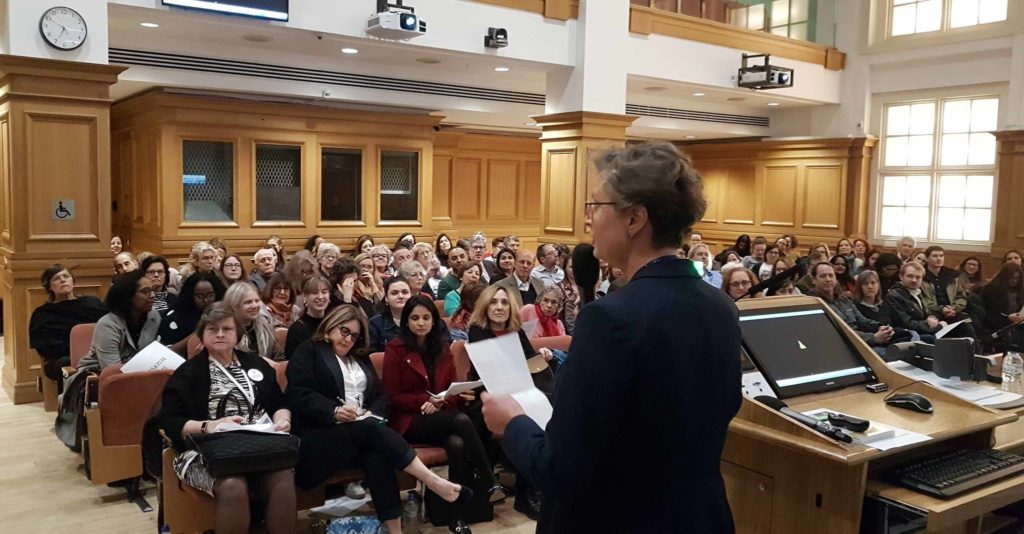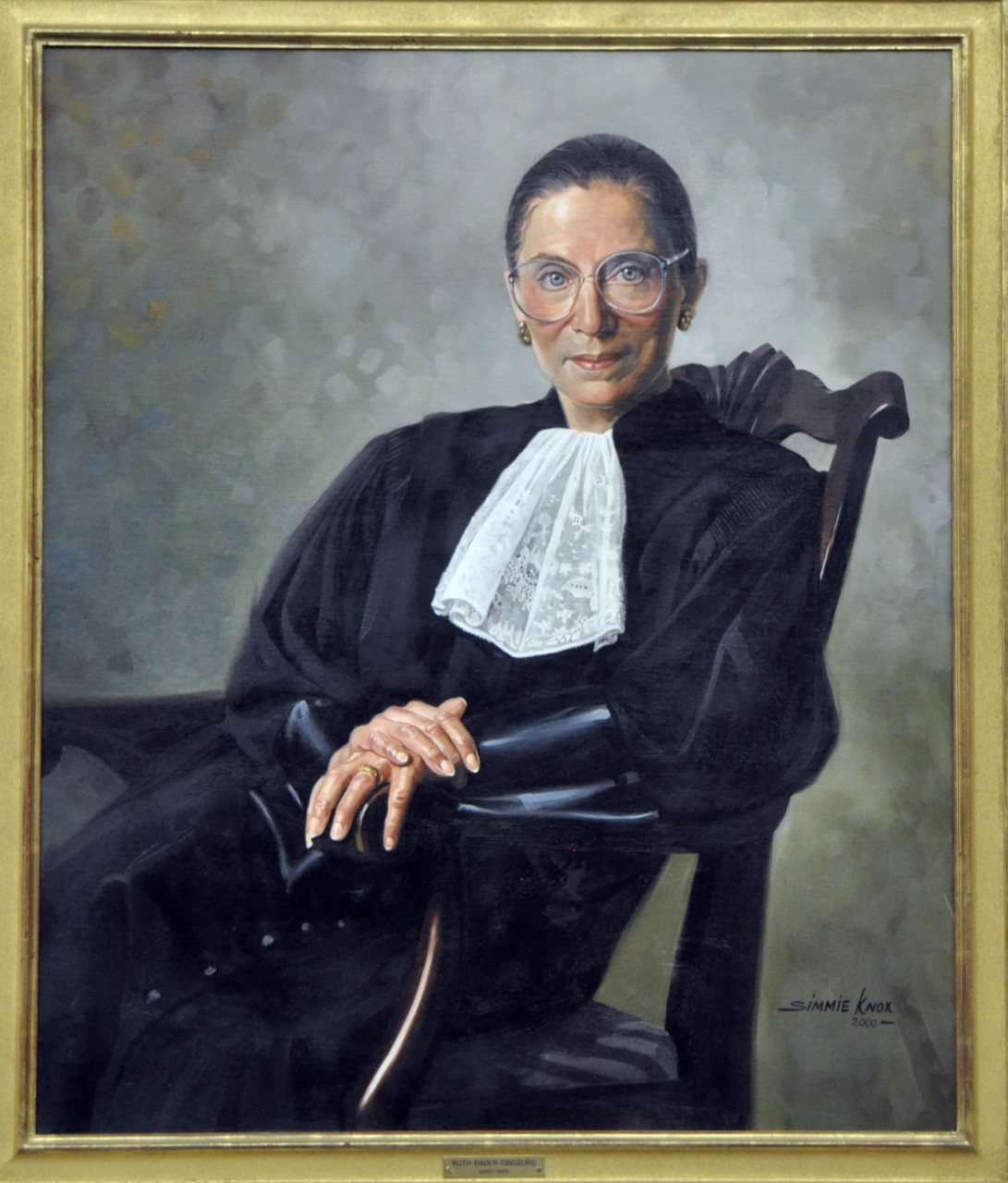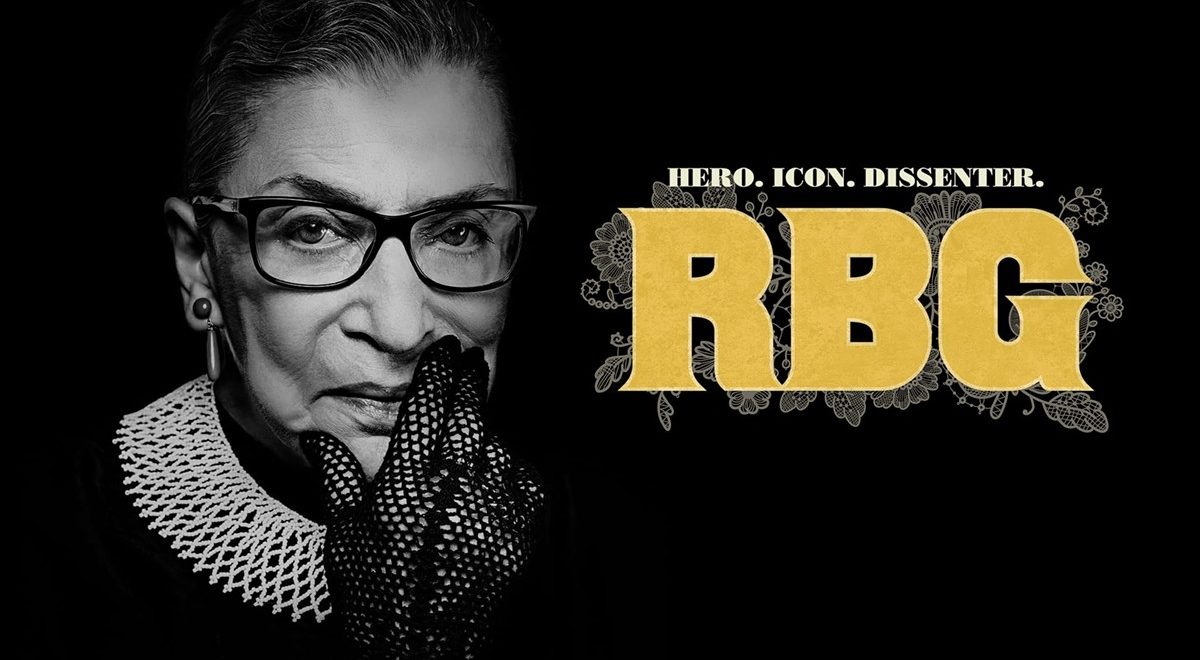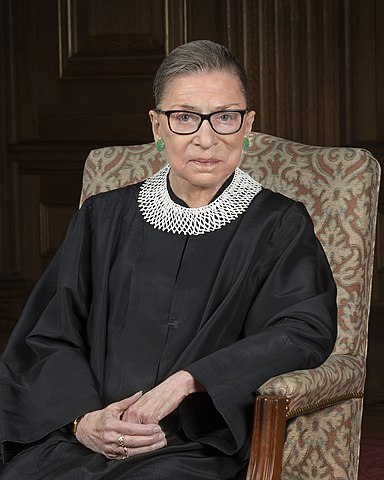Film Credits
Co-directors and Producers: Julie Cohen and Betsy West
Cinematographer: Claudia Raschke
Film editor: Carla Gutierrez,
Interviews with the Filmmakers
Interviews with RBG
Briefing Notes
FAQs About Ruth Bader Ginsberg and the Film
The Film Night
“Without a definitive Ginsburg biography, the unique personal journey of this diminutive, quiet warrior’s rise to the nation’s highest court has been largely unknown, even to some of her biggest fans — until now.” – From the film RBG, 2018
This lively and engaging documentary draws upon interviews, including reflections from Ginsburg herself, public appearances, and archival material. It provides an absorbing and intimate account of her personal and professional life. It has won multiple awards, including nominations for best documentary from the Oscars and BAFTA, and was the winner of Best Political Documentary from the Critics Choice Documentary Awards in 2018.
As an academic and lawyer, Ruth Bader Ginsberg was a champion of progressive jurisprudence, focusing on opposing sex discrimination and supporting gender equality. As a Supreme Court judge, she has also contributed to important decisions and discussions on issues such as Citizens United (re campaign finance), voter ID laws and voter protection. Her work – as an academic, civil rights litigator, and in her pronouncements as a judge – has had enduring impact.
This Film Night offered a unique opportunity to discuss with a DAUK audience the many issues this film raises. Leading the after-screening discussion are three DAUK members who trained as lawyers during different ‘phases’ in opportunities for women in the legal profession. Some of the themes they will address include the extent to which women’s opportunities and roles in the legal profession have changed since RBG began her career, the significance and prospects for the ERA, and RBG’s legacy as an advocate, supreme court justice and cultural icon for gender equality under the law.
About The Film Night Speakers
Susan Schoenfeld Harrington started her political life as a “babe in arms” at the March on Washington. She has served as a DAUK Vice-Chair, member of the Executive Committee and DPCA representative.
Susan is a 1987 graduate of Columbia University Law School (after finishing Wellesley College in 1984- where she received a Harry S Truman Scholarship). She practiced media, real estate, as well as mergers and acquisitions law in New York City in the late 1980s and early 1990s, before moving to Hong Kong after being awarded a Fulbright Scholarship.
In Hong Kong, she worked with the Consumer Council on new media policy, taught media law at Chinese University, and launched a media consulting firm AIMASIA, which advises international media companies on entry into Asian markets. After meeting her British husband, Susan moved to London, originally working for Hydra, a media consultancy and raising her family.
In addition to her work in New York real estate, she serves on several boards in the US and UK and has recently been named a Deputy Finance Chair of the DNC.
Carol Moore is a Democratic activist, passionate about women’s rights and affordable healthcare for all Americans and committed to working for tax reform for American expatriates. She is a former Chair of DAUK, a founding Co-chair of the Democrats Abroad UK Women’s Caucus and a Precinct Leader in the Palm Beach County Democratic Party in Florida. Carol has been a member of DAUK for over 30 years and in 2018 was Co-chair of the DAUK Florida States initiative which focused on a phone-banking campaign that contributed to delivering a record number of overseas Democratic votes in the Florida election.
Carol is a native of Long Island, New York, a graduate of the Georgetown University School of Foreign Service, received a JD from Fordham Law School and an MBA from NYU. After a banking career in the City, Carol moved into education finance before retiring to volunteer with Democrats here in London and in the States. She has just returned from visits to DC lobbying members of the House Ways & Means Committee with the DA Tax Reform team, and to Tallahassee, Florida with the Democratic Women’s Club of Florida, to meet legislators and promote progressive priorities and the ratification of the Equal Rights Amendment!
Asha Subas’ childhood dream was to be a lawyer. She pursed that dream by graduating with a double-major in history and political science from the UCLA and receiving a law degree from the University of Southern California.
On September 15, 2008, Asha started her first career as a litigation associate at a ‘big law’ firm. There, she had a substantial federal law practice consisting of large-scale securities class action suits with the occasional antitrust, internal investigations or white-collar crime matters. In addition, Asha’s pro-bono and charity work working with immigrant communities exposed her to a different side of the federal law. Through working with vulnerable populations, Asha developed a particular interest in the evolving law regarding sex and gender-based violence and immigration.
Asha was recently elected to the DAUK council and leads the immigration group within the Policy Network and Resolutions Committee

DAUK Chair Inge Kjemtrup introduces the RBG Film Night

FAQs and The Issues at Stake
FAQs about Ruth Bader Ginsberg and the Film
Short answers to some quick-fire FAQs
What’s the difference between RBG and On The Basis of Sex?
RBG is a documentary, and On The Basis Of Sex is a biopic feature. Both films explore the life of Ruth Bader Ginsburg; however, the approach varies. RBG aims to tell the story of Ginsburg’s entire career, while On The Basis of Sex focuses on a single important case. The filmmakers view them as sister productions, and examined the same footage, notes, and briefs, as they made each film.
From where did the term “Notorious RBG” come?
After Ginsburg’s dissent in Shelby County v. Holder, denying the Voting Rights Act of 1965 to discriminate against poor and minority voters, the Tumblr account was created and dedicated to showcasing her achievements in a light-hearted way.
How is Ginsburg regarded among her peers?
She is often referred to as “the smartest person on the East Coast.”
What gender discrimination did Ginsburg face during her career?
Ginsburg faced great discrimination throughout her life, including the inability to find a job upon graduation, despite being first in her class. When she became the second-ever female law professor at Rutgers University, she was informed that she would be paid less than her male peers, and was told “You have a husband who earns a good salary.” She has also said, “You felt, in class, as if all eyes were on you and that if you didn’t perform well, you would be failing, not only for yourself, but for all women.”
How many women have served on the US Supreme Court?
Sandra Day O’Connor was the first woman US Supreme Court Judge. She was followed by Ginsburg, and has since been recently joined by Justices Sonia Sotomayor and Elena Kagan. Before Sotomayor and Kagan, Ginsburg was the only female justice of the current group.
She has referred to herself as a “flaming feminist.” What does that mean?
About feminism, she has said “I think the simplest explanation and one that captures the idea is a song that Marlo Thomas sang “Free to Be You and Me.” We should each be free to develop our own talents, whatever they may be, and not be held back by artificial barriers, man-made barriers, certainly not heaven sent.”
What was her overarching strategy when fighting these pivotal cases?
She has said, “Our strategy was the soul of simplicity. It was to go after the stereotypes that were written into law and to show that many could be disadvantaged by the stereotype. We wanted people to be judged by what they do, by the functions they perform, and not by gender.”
What prep work did she undertake before fighting for women’s equality in the legal system?
She has said, “I read every federal case that had to do with women’s equality or the lack thereof and every law review article. Now that seems like it was quite an undertaking but in fact, it was easily manageable because there was so little.”
Further questions
What has been RBG’s impact – as an advocate, lawyer and judge? Read more
This website provides information on RBG’s life, opinions, dissents and arguments before the Supreme Court. Last updated January, 2019.
On the Affordable Healthcare Act
A concurring (but different) opinion in NFIB v. Sebelius -the Affordable Care Act case, that reached the Supreme Court in 2012.
“The provision of health care is today a concern of national dimension, just as the provision of old-age and survivors’ benefits was in the 1930’s. . . . Beyond question, Congress could have adopted a similar scheme [to Social Security] for health care. Congress chose, instead, to preserve a central role for private insurers and state governments. According to The Chief Justice, the Commerce Clause does not permit that preservation. This rigid reading of the Clause makes scant sense and is stunningly retrogressive. Since 1937, our precedent has recognized Congress’ large authority to set the Nation’s course in the economic and social welfare realm. See United States v. Darby, 312 U. S. 100, 115 (1941) (. . . recognizing that “regulations of commerce which do not infringe some constitutional prohibition are within the plenary power conferred on Congress by the Commerce Clause”). . . . The Chief Justice’s crabbed reading of the Commerce Clause harks back to the era in which the Court routinely thwarted Congress’ efforts to regulate the national economy in the interest of those who labor to sustain it.”
On voting rights:
Sheppard, Kate. “The Best Lines from Ginsburg’s Dissent on the Voting Rights Act Decision.” Mother Jones. June 25. 2013.
This was the infamous Supreme Court decision that struck down the part of the 1965 Voting Rights Act that determined which cities, counties, and states need to seek approval from the Department of Justice before changing their voting laws. Her full dissent is here, beginning on page 49.
A dissenting opinion in Veasey v. Perry, a 2014 case challenging a Texas voter ID law which the Court upheld 6-3:
“The greatest threat to public confidence in elections in this case is the prospect of enforcing a purposefully discriminatory law, one that likely imposes an unconstitutional poll tax and risks denying the right to vote to hundreds of thousands of eligible voters.”
What has been RBG’s impact on the law on sex and gender equality?
Podcast “On Ruth Bader Ginsburg’s Stamp on the ACLU” January 24, 2019 talks about her role in the ACLU and the impact of the ACLU Women’s Rights Project which she founded in 1972.
Greenhouse, Linda. “Why R.B.G. Matters: A new decision on women and the draft underscores her consequential role in shaping the law on sex equality”. New York Times. February 28, 2019
To what extent have women’s opportunities and roles in the legal profession changed since RBG’s career began?
“Quick Take: Women in Law” . Catalyst. October 2, 2018.
What is the Equal Rights Amendment (ERA) ? What difference would it make? Will it be ratified ?
The ERA is a proposed amendment to the U.S. Constitution: “Equality of rights under the law shall not be denied or abridged by the United States or by any State on account of sex.”
RBG on the ERA: needed to inscribe “equal rights for men and women as a fundamental tenet of our society.”
Resources:
The Democrats Abroad Global Women’s Caucus provides information here.
“One of Democrats Abroad’s key issues is to secure the rights of women through the ratification of the Equal Rights Amendment. DA unanimously passed a resolution in May 2018 to support ERA. We need one more state to ratify the Equal Rights Amendment for it to become part of the U.S. Constitution.”
And has initiated a number of DA campaigns in support of the ERA.
Other resources:
Equal Rights Amendment: A website that provides a wide range of resources on the history, ratification process and issues, and FAQ.
Equal Means Equal An organization and website that provides information and resources, including a documentary, about women’s unequal status in the USA today. Campaigns for the ratification of the ERA.
Official photo by Simmie Knox, under commission of SCOTUS Supreme Court (public domain)
Disclaimer: The screening of this film does not constitute an endorsement or promotion of the film, nor of any views expressed therein or any association with The Film Committee, DAUK, Democrats Abroad or the Democratic Party. Screenings are solely conceived as educational activities: offering an opportunity for members to discuss issues.
Links to other organizations or publications imply neither endorsement of their policies nor any association with the Democratic Party or Democrats Abroad – UK.



